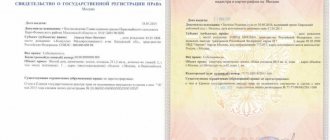Illegal residence in the owner’s apartment: what to do
Now we have arrived with a child, but people living illegally do not allow me to go home. I wrote a statement to the local police officer, but they told me that the police do not have the right to kick them out and that we have been walking along the street with our child for 8 days now and are asking to spend the night with friends. Tell me what to do?
Answer:
Unfortunately, the police officers act lawfully. Determining whether residents live in your apartment legally or illegally is not within the competence of the police - this is the prerogative of the court. According to Art. 80 of the Housing Code of the Russian Federation, temporary residents are considered to be citizens moved in by the tenant of a residential premises and members of his family for temporary free residence in a residential premises. Temporary tenants cannot occupy the tenant's living space for more than six months in a row (clause 2 of article 80 of the Housing Code of the Russian Federation, paragraph 1 of article 680 of the Civil Code of the Russian Federation). Tenants are required to vacate the premises immediately after the expiration of the period agreed with them, and if it is not agreed upon - no later than 7 days from the date of presentation of the request to leave. If an eviction dispute arises, the court may require such a request to be made in writing. If temporary residents refuse to vacate the residential premises, temporary residents are subject to eviction from the residential premises in court (clause 5 of Article 80 of the Housing Code of the Russian Federation). After a court decision is made, illegal tenants are evicted by the bailiff service. Much depends on whether you have the title documents for the apartment in your hands. It is also worth making sure that the apartment is still your property (it has not been re-registered by unscrupulous tenants). Check at the passport office who is registered in your apartment. Check ownership according to Rosreestr. It should be noted that cases involving the eviction of illegal tenants can last for years. If the apartment belongs only to you by right of ownership, and no one else is registered there, then I would not contact anyone at all except reliable friends. You can open the door with a key or, having in hand the documents for the apartment (original property registration certificate) and a civil passport, call the Ministry of Emergency Situations and open the door. Put things and residents out the door, install a new door (lock) and install a security alarm. This is not entirely legal (they can be held accountable for arbitrariness), but at least you won’t have to spend years hanging around with your child through friends. Let the illegal residents then, if they are dissatisfied, prove themselves that they lived there and they have grounds for this.
Sincerely, Victoria Bondareva (Nautilus Lex Law Firm).
Consultant's response published 11/19/2012 Legislation may change
→
Application to the prosecutor's office
There are a number of situations when you should contact the prosecutor's office and the law allows for a decision to evict administratively. This option is possible if the applicant does not have the right to independently go to court, since he is not the owner of the residential premises. For example, if the owner died, the heir has not yet taken over the rights, and third parties have occupied the property without permission. Important!
The evicted citizen has the right to appeal the prosecutor's decision in court. Administrative eviction is carried out with the sanction of the prosecutor and can be carried out in the following cases:
- if the building is in disrepair and there is a threat to the lives of those living in it.
- if entry into the apartment occurred with the use of force against the owner;
- if the home is occupied without permission;
Statement of claim for eviction of illegal residents from an apartment
If there is a situation where people live in your apartment without any reason for this, the solution will be to go to court with a claim to evict illegal residents from the apartment. The latter include those who:
- moved into someone else's apartment without permission;
- lost the right to use this residential premises due to a change in marital status (after a divorce, for example, the ex-husband or wife no longer have any rights to an apartment of which they are not the owners);
- lived in the apartment under the terms of a fixed-term lease agreement, which was not continued with him;
- while living in the apartment, he more than once committed actions that were detrimental to the premises (destruction, etc.), and also violated the rights of other people with his behavior (night noise, round-the-clock alcohol festivals with “barbecues” on the balcony, etc.);
- received permission to live in an apartment that is in common ownership, not from all of its co-owners.
In all cases where such people do not show any intention to voluntarily leave the apartment, its owner will have to apply to the court to resolve this conflict. There is no other choice for a law-abiding homeowner - only bailiffs who execute a judge’s decision on this can forcibly evict a person from their home.
In order for a judge to consider an eviction case, you must file a claim with him. The legislator in Art. 131 of the Code of Civil Procedure of the Russian Federation established the requirements that a statement of claim for eviction must meet and which must be complied with without fail (otherwise the case will not be accepted for consideration).
The claim format must contain the following sequential sections:
- introductory - determination of the court where the case should be heard (according to Article 30 of the Code of Civil Procedure of the Russian Federation, this is the court in the territory where the apartment is located) and a listing of everyone involved in this conflict: data of the plaintiff, i.e.
Responsibility
For illegal registration, citizens face administrative and criminal liability for both the owner of the property and its residents.
For violation of registration rules, including fictitious registration, administrative liability is provided under Article 19.15.2.
It is applied if law enforcement agencies do not find signs of a criminal act.
The violators themselves will receive a fine of 2-3 thousand rubles. In addition, the owner/tenant of the apartment will be subject to a fine. For him, penalties are set at 3-5 thousand rubles.
If the fact of illegal registration is detected in Moscow or St. Petersburg, the fine will be issued in an increased amount. For illegally registered residents it will be 3-5 thousand rubles, for owners – 5-7 thousand rubles.
The Criminal Code has an article (322.2) that provides for liability for fictitious registration of Russian citizens, as well as stateless persons or foreigners at their place of stay/residence.
The rules of this article provide:
- fine 100-500 thousand rubles;
- a fine in the amount of salary or other income for a period of up to 3 years;
- corrective labor for up to 3 years;
- imprisonment for up to 3 years.
Measures can be applied to both the owner and residents. But in the latter case, it is necessary to prove that they intentionally paid the owner for illegal registration, and this is very difficult to do. Also, this article of the Criminal Code applies to officials.
The law does not distinguish between illegal permanent or temporary registration, as well as for those who are registered in the apartment: Russians or foreign citizens. All cases are dealt with equally strictly.
If a citizen himself helps solve a crime and gives the necessary testimony to law enforcement officers, then he can be released from criminal liability.
The sale of a share of a land plot can only occur after obtaining the consent of all co-owners.
What is clarification of the boundaries of a land plot and how is it carried out? Find out about it here.
How is land tax paid and who is exempt from paying it? We talked about this in our article.
How to evict an illegally living person from an apartment
e. the owner of the apartment, and the defendant - the one who needs to be evicted (their personal data, addresses and means of communication are indicated);
At the end of this document, written evidence is listed that the applicant uses to support his arguments, and also indicates the attached original bank payment document confirming the payment of the fee to the state for the court case. After the statement of claim is dated and signed by the applicant, it is submitted to the court through the office or by mail.
Evidence of illegal residence of a person
The law stipulates that people who do not have documents proving their legal location in the apartment cannot be evicted without a court order. Therefore, it is important for the owner to collect as much as possible all the evidence that indicates that unauthorized persons are living in his apartment.
In addition to documents of ownership, the owner can present witness statements from neighbors and CCTV footage. All evidence must be in writing. A statement to the police written when illegal occupants are discovered will also be considered by the court.
The owner must clearly formulate the reasons why it is impossible for these persons to live in his house. Evidence may include:
- Extract from the house register;
- Rent receipts;
- Materials of private detective investigation;
- It is advisable to provide the court with the results of an examination to assess the damage caused by illegal occupants.
How to evict illegal residents?
In the __________ district court of the city _______, ___________________________ ___________________________
Plaintiff: _____________________ address: ______________________
Defendant: ____________________ address: ________________________
STATEMENT OF CLAIM for eviction of a former family member from the apartment
Based on the certificate of state registration of property rights N ____________________________________ dated “___”___________ ______ (copy attached), I, __________________, am the owner of a ___-room apartment with a total area of ______ sq. m. m, located at: _________________________. During the period of acquisition of the specified real estate, I _______________ was not married. In the period from __________ to "___"______ ____ I was married to the defendant. For joint family residence, I registered my ex-husband - __________________ - and daughter - ____________________, born _____ in the indicated apartment at the place of residence. By the decision of the magistrate of court district No. ___ of district ______ of ________, the marriage between me and the defendant was dissolved (a copy of the divorce certificate is attached). According to paragraph 4 of Art.
Grounds for eviction
In what cases can they be evicted from a municipal apartment without providing other living space:
- Causing damage to property, apartment;
- Failure to comply with the rules of residence;
- Housing is not used for its intended purpose.
Eviction of unauthorized persons for these reasons is possible if the violator of the order was repeatedly warned about such a preventive measure as eviction from the apartment, but did not stop the violation of the order.
Moving in a citizen without providing living space is possible if the apartment or room is departmental. Employees who no longer work at the company may be evicted. And others will take their place.
Ask a question, we are online!
Leave a message!
+7 (812) 313-2-106 legal advice on eviction
Eviction of an illegally residing person from an apartment
31 of the Housing Code of the Russian Federation, in the event of termination of family relations with the owner of a residential premises, the right to use this residential premises for a former family member of the owner of this residential premises is not retained, unless otherwise established by an agreement between the owner and the former member of his family. Since the family relationship between me and the defendant, my ex-husband, has been terminated, the right to use the residential premises - the indicated apartment belonging to me at the address: ____________________ - is not retained by the defendant. I have repeatedly offered to help the defendant find another place to live, so that he can live separately and leave my apartment, especially since he has no legal grounds for living in it. However, he does not take any action to resolve his housing issue and move out of my apartment. It should also be noted that the defendant’s parents have a ___-room apartment in the city ___________ (a copy of the extract from the Unified State Register is attached). But he did not want to move in with them. “__”_________ ___ I offered the defendant to vacate my apartment by __________. By virtue of paragraph 1 of Art. 35 of the Housing Code of the Russian Federation, if the defendant’s right to use the residential premises is terminated, he is obliged to vacate the apartment (stop using it). If he does not vacate the apartment within the prescribed period, he is subject to eviction at my request based on a court decision. Based on the above and in accordance with Articles 31 and 35 of the RF LC, as well as Articles 131, 132 of the RF Civil Procedure Code,
I ASK: To evict the defendant _____________________________, born __________, born _____________________ from the ___-room apartment owned by me, located at the address: _____________________________________ Attachments: copy of the statement of claim; a copy of the certificate of state registration of ownership; a copy of an extract from the house register; a copy of the divorce certificate; a copy of your daughter's birth certificate; a copy of the court decision on divorce; a copy of an extract from the Unified State Register; receipt of payment of state duty.
"___" ________________ G. ___________________ /____________/
The procedure for eviction of citizens living in housing illegally
The process of their eviction is divided into successive stages:
- Initially, you need to try to solve the problem in a pre-trial manner, for which you can try to peacefully negotiate with citizens so that they leave the property;
- then you can contact the local police officer, police officers, or even employees of the management company;
- It is not allowed to use physical force against these people, as this is considered a violation of their rights, so they can file a counterclaim;
- The situation becomes especially complicated if small children live in the property together with adults, so you will have to obtain permission from the guardianship authorities, and they must first make sure that the child’s parents have the opportunity to move him to another property;
- if no actions and methods give the desired result, then you will have to file a lawsuit;
- it is important to correctly draw up an application, as well as attach documents to it confirming that citizens are indeed living in the living space illegally;
- additionally, evidence is needed that pre-trial methods of solving the problem were used;
- it is advisable to attach protocols received from the district police officer, use written testimony from witnesses, and also attach photographs and video recordings;
- if it is necessary to recover additional funds from citizens for damage caused to real estate, then an expert opinion will be required, which contains all the damage caused;
- Usually several meetings are required at once;
- if the decision is made in favor of the plaintiff, then the writ of execution is handed over to the bailiffs, who then use various measures to force the violators to leave the home through various forced actions.
Important! It is permissible to use force if, after numerous persuasion, citizens do not comply with the court decision, but the process is carried out only by bailiffs.
Illegal entry into public housing
The owner of public housing is usually the city or state, so they will enter into contracts with tenants. Since the right of ownership belongs to a non-resident, all actions to move in new residents take place with the consent of the landlord. Family members have the same right.
Any residence without permission is considered illegal, except for minor children.
Neighbors may pay attention to such use of the apartment, this is especially noticeable when the apartment is rented to illegal migrants. This is called a violation of the rules of residence, for which the owner of the apartment can file an eviction lawsuit. Rating 4.75 (2 Votes)









